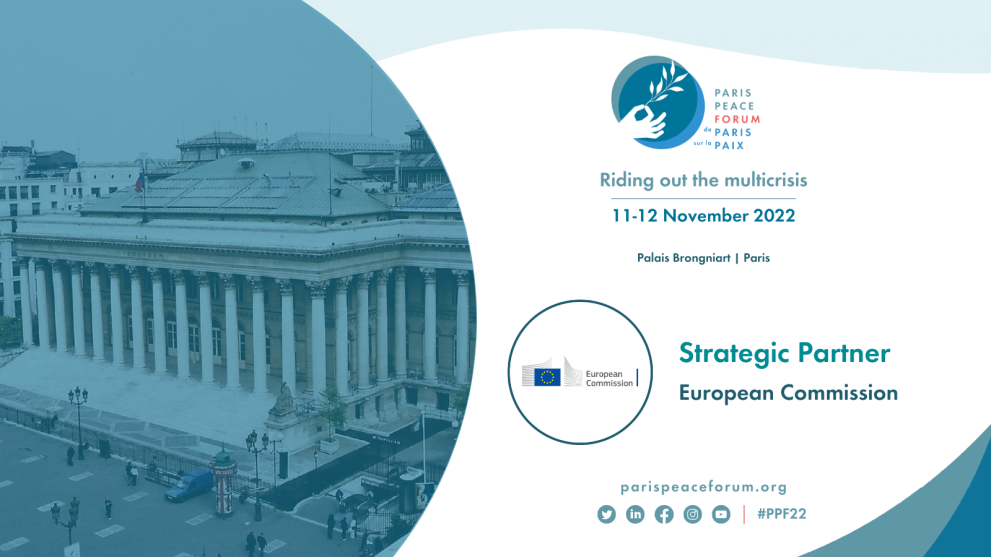
High Representative/ Vice President Josep Borrell Fontelles will participate in the event. The Forum will focus on "riding out the multicrisis" and preventing a destructive world polarisation. It will also explore how to mitigate the multiple shocks and socio-economic aftermath of the crises. Finally, the Forum will show examples of resolve, resilience, solidarity and innovation from stakeholders of the North and South to address today’s most pressing issues in the midst of a volatile and fast-changing context. A series of projects contributing to bringing solutions in these fields will be highlighted during the event.
The European Commission’s Service for Foreign Policy Instruments (FPI) will take part in the Forum this year and participate notably in a round table on mental health and psychosocial support in transitional justice in conflict and post-conflict settings, as part of the ‘Cooperation through conflicts’ theme. FPI will also present three EU co-financed projects: 1) on protecting Ukrainian heritage amid the war, 2) on human-centric approach to Artificial Intelligence, and 3) on local participation for security and resilience in Sahel. They highlight some of EU’s contribution to “riding out the multicrisis”.
On 11 November at 11:15-12:15, Peter M. Wagner, Head of Service of the EU’s Foreign Policy Instruments will host and take part in the debate “Bringing justice and repairing damaged souls: Mental health and psychosocial support in transitional justice”. He will also participate in a number of other roundtables.
During and after violent conflict or authoritarian rule, in which widespread violations of international humanitarian law and human rights occur, traumatic experiences of survivors are often not addressed due to a lack of mental health support capacities and due to cultural barriers. As a consequence, individuals, families, communities, and entire societies suffer continued and intergenerational trauma. Providing mental health and psycholosocial support is, therefore, a critical element of a comprehensive transitional justice approach.
The roundtable will bring together transitional justice practitioners who use mental health and psychosocial support in their work, artists that use art as a form of trauma therapy in their work with victims of mass atrocities, mental health practitioners who work in conflict and post-conflict settings, and academics who work on the links between peacebuilding/transitional justice and mental health and psychosocial support.
The three FPI-funded projects will be showcased on 11-12 November at the Paris Peace Forum in different booths:
Action Plan for Protecting Ukrainian Heritage project
The project “Action Plan for Protecting Ukrainian Heritage” funded by the FPI and implemented by Alliance internationale pour la protection du patrimoine dans les zones en conflit (ALIPH) is committed to provide concrete support to protect Ukraine’s invaluable heritage (e.g. museums, libraries, and archives) as well as its heritage professionals amid the war. To date, ALIPH has helped more than 150 museums, archives, and libraries protect their collections, supported the protection of monuments and sites, and assisted Ukrainian professionals for a total amount of 2 million EUR.
InTouchAI.eu project
The “International Outreach for a human-centric approach to Artificial Intelligence”(InTouchAI.eu) project funded by the FPI and implemented in cooperation with DG CONNECT, promotes the responsible development of trustworthy AI at global level and prepares the ground for global alliance building in this field.
At the Paris Peace Forum, InTouchAI.EU will highlight that mitigating the risk of irresponsible use of AI in situations where people face or are at risk of violence is of paramount importance. Thus, a focus should be on innovative multi-stakeholder coalitions to ensure that AI technology is a means to build trust, conflict resolution and to support mediated approaches to building lasting peace. Technologies such as AI already have a considerable effect on our lives. New and stronger forms of cooperation and diplomatic relations are needed, enabling us to integrate the challenges of global governance of AI with those from technology, society, and the economy.
Local participation for security and resilience project
FREXUS project supports the peaceful resolution of social tensions and conflicts between population groups that are caused or exacerbated by climate change. The specific objective is to support more conflict-sensitive and climate-sensitive management of land, natural resources and ecosystems in targeted communities, taking into consideration the needs of vulnerable groups. The project uses an integrated approach of water-energy-food security nexus in the areas of development and security that creates new opportunities ensuring long-term sustainable development and peace.
Find out more:
Details
- Publication date
- 10 November 2022
- Author
- Service for Foreign Policy Instruments
